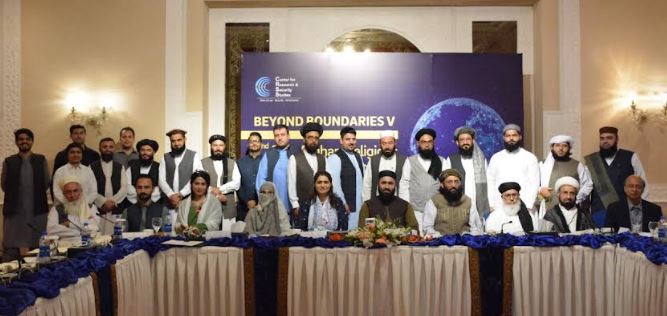Islamabad, Sept.21 /DNA/ – The need for Taliban’s compliance with Doha Agreement – as a mitigation against denial of their international recognition – figured prominently during the 2ndPak-Afghan Religious Scholars Conference held by Center for Research and Security Studies (CRSS) as part of its track 1.5/2 initiative Beyond Boundaries. The participating Afghan and Pakistan religious scholars stressed that compliance is important for all parties to the agreement, as much as it is for Taliban.Bilateral violation of the Doha agreement is the root cause of Afghanistan’s tribulations.

A diverse group of religious scholars, hailing from different provinces of Pakistan and Afghanistan, representing different schools of thought and sects, attended the two-day dialogue with the agenda focused on girls’ education and women’s rights in Afghanistan, the state of peace and security, and the inclusion of all ethnic groups in the government led by the Taliban.
Dr. Huma Baqai, an international relations expert, presented on one year of Taliban rule in Afghanistan, giving a critical insight into the developments occurred since August 15, 2021, the impediments in the way of recognition, the regressive policies adopted by the Taliban, such as the girls’ school ban and restricted mobility and lack of livelihood opportunities for women, and the impact of parochialism on the future of the country and its social fabric.
Conference chair, Mr. Mansoor Ahmad Khan, Pakistan’s Former Ambassador to Afghanistan, stated in his keynote address that the Taliban have restored peace in the country and armed resistance has weakened since they assumed power, but the presence of certain terrorist groups on Afghan soil poses a threat to regional peace and stability, so the Taliban must concretely tackle the issue, and that they need to take further steps to ensure their government gets the due recognition. He further said that Afghan institutions with a public consensus should develop a legislative and social system that ensures the safety and welfare of all individuals and ethnicities at par with international standards. “However, the responsibility lies on the international community as well. They must continue engaging with the Taliban, so the country takes necessary and measured steps toward recognition. In the contemporary era, no state/country should be left isolated.” he said.
Scholars from both sides opined that deviation from Doha Agreement is detrimental to the Afghan cause, and the Taliban would lose clout in the international arena if they do not follow it in letter and practice, but, the United States and other countries also need to be mindful of Afghanistan’s sovereignty and adopt a policy of non-interference. They also said that an authoritarian approach cannot help Afghanistan, but introspection and inclusive and prudent decision-making can. It was also suggested that the Taliban should make peace with their own people by initiating legislation that ensures equal participation and agency for all ethnic and religious groups of the country, and, to take the country out of the crisis, they must appoint technocrats so the current setup can sustain.
Strong emphasis was made on the issue of girls’ education. Mr. Imtiaz Gul, Executive Director of CRSS, said that the Taliban have a weak government and are currently under massive international pressure, amidst all this, they should first address the issue of the girls’ school ban and the international community also should stick to this demand as education is the essence of a prosperous nation. “Without an educated lot, Afghanistan cannot move forward. The immediacy of the matter calls for urgent and positive action i.e., to reopen girls’ schools for grades 6-12 or chalk out alternative ways such as homeschooling, distant/virtual learning, etc.”, said Mr. Gul.
All scholars agreed that sanctions on Afghanistan would not harm the Afghan elite, but the common masses. Hence, the Taliban need to provide relief and earn the confidence of their people by addressing the vexing issues first. The two-day conference concluded with a set of recommendations underpinning the need for an improved state of security in Afghanistan and a zero-tolerance policy by the Taliban against terrorism, immediate reopening of girls’ schools, an all-encompassing system of governance representing all ethnic groups, and an increase in the frequency of track 1.5/2 diplomacy dialogues between the religious stakeholders from Pakistan and Afghanistan.











